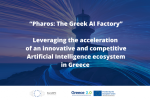
Greek scientific publications in the field of Artificial Intelligence (AI) show a steady upward trend in the fifteen-year period 2006-2020. In particular, they increased from 1,175 publications in the five-year period 2006-2010 (annual average 235 publications) to 1,411 in 2011-2015 (annual average 282) and to 1,839 in 2016-2020 (annual average of 368). These data are presented in the new publication (in Greek) of the National Documentation Centre (EKT) entitled: ‘Identification and analysis of Greek scientific publications in the field of Artificial Intelligence using Machine Learning techniques’ (https://metrics.ekt.gr/publications/633)
The EKT publication presents the number of Greek scientific publications in the field of Artificial Intelligence for the period 2006-2020, impact indicators, the main research entities that appear to be active in the field, as well as international networks of collaborations developed by Greek researchers.
As noted by the Director of EKT, Dr. Evi Sachini, ‘The central aim of EKT's statistical activities, in addition to the production of established European and national statistics, is to highlight data that reflect the dynamics of Greek research in new scientific and technological fields. In the 21st century, AI opens up new horizons, enhances innovative applications in many industries, while being the focus of national and public policies. EKT, for the first time, collected and processed, with machine learning techniques, the data from all international bibliometric bases and identified the scientific publications of Greek institutions in the dynamically developing field of Artificial Intelligence’.
The originality of this publication concerns both the indicators it presents and its methodological approach, as machine learning techniques were used to identify those scientific publications related to Artificial Intelligence. Specifically, the identification and classification of scientific publications as ‘publications related to the field of Artificial Intelligence’ was carried out by constructing, adapting (fine tuning) and applying the BERT machine learning model. The source material includes publications in scientific journals and conference presentations (conference proceedings) and was collected from the Web of Science bibliometric databases, Scopus, the SCImago Journal & Country Rank portal, as well as complementary international specialised reports
Greek higher education and research institutes achieve significant production of AI-related publications
Between 2006 and 2020, a total of 4,425 scientific publications related to Artificial Intelligence were identified, showing a strong upward trend. Specifically, in the year 2006, only 135 publications were recorded, however, in 2020, there were 444 publications, which is the highest performance for the reference time period of this research.
As far as higher education and research entities that produce these publications is concerned, Universities occupy the top three positions. In particular, the University of Patras ranks first with 631 publications, followed by the Aristotle University of Thessaloniki with 556 publications and the National Technical University of Athens with 448 publications. The Foundation for Research and Technology - Hellas (FORTH) with 322 publications is in fourth place followed by the University of Piraeus (296 publications), the Democritus University of Thrace (260 publications), the National and Kapodistrian University of Athens (250 publications) and the Technical University of Crete (198 publications).
The most common terms that highlight the individual specialised sub-fields of Artificial Intelligence, in which Greek institutions seem to be specialised (identified within the abstracts of such publications) are robot, neural network, machine learning, fuzzy c, fuzzy logic, genetic algorithm.
In terms of cooperation and networking, in total, the countries with which Greek research teams cooperated on scientific publications related to Artificial Intelligence for the period 2006-2020, amounted to 71. Using the geographical addresses (affiliations) of the authors, Great Britain, the USA, France, Germany, Italy, Spain, China, Cyprus, the Netherlands and Belgium are the countries which scientists of Greek institutions and organisations are collaborating the most in terms of co-authoring such publications.
EKT's publication ‘Identification and analysis of Greek scientific publications in the field of Artificial Intelligence using Machine Learning techniques’ is the beginning of a new series of publications in presenting bibliometric analyses with a thematic specialised approach to areas that are at the cutting edge of technological development and present a wider interest.















